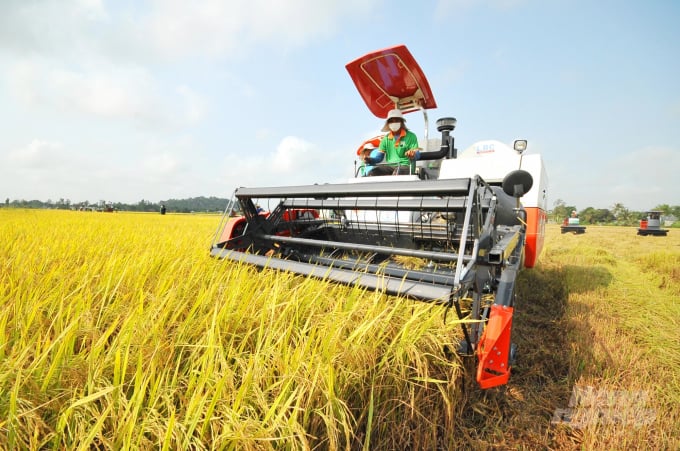May 18, 2025 | 16:36 GMT +7
May 18, 2025 | 16:36 GMT +7
Hotline: 0913.378.918
May 18, 2025 | 16:36 GMT +7
Hotline: 0913.378.918

The VnSAT project has helped change the rice production in Dong Thap and many provinces in the Mekong Delta. Photo: Van Vu.
In the 2016-2021 period, the VnSAT Project has implemented a demonstration model that applies "3 decreases 3 increases" and "1 must 5 decreases" in Dong Thap province's 6 northern districts. Thereby, the model is evaluated as effective and is currently being replicated by farmers.
To implement the VnSAT project, the local agricultural sector has organized 566 training courses with more than 20,000 farmers participating; built 75 farming models of "3 decreases 3 increases" and "1 must 5 decreases" with 140 hectares and 100 farmers participating.
The application area of "3 decreases, 3 increases" and "1 must 5 decreases" for the whole VnSAT project is 24,232 hectares (accounting for nearly 5% of the province's rice cultivation area). The model "Ideal rice production" is piloted by My Dong 2 Cooperative, Thap Muoi district, and Rynan Smart Fertilizers Company on 7.6 hectares.
Accordingly, applying high technology in production helps people reduce the amount of seed. The average yield is 7-8 tonnes of fresh rice per hectare. The production cost is reduced by 45 - 50% compared to the old farming method, ensuring high profits for farmers.
Translated by Ha Phuc

(VAN) 14 out of 35 domesticated elephants in Dak Lak province have had their living conditions improved, with 11 of them currently participating in the non-riding elephant tourism model.

(VAN) Muong Nhe Nature Reserve hopes that being upgraded to a national park will lay the foundation for forest protection efforts to be carried out in a systematic, modern, and sustainable manner.
/2025/05/16/3923-2-171845_52.jpg)
(VAN) Lower costs, higher yields, and improved soil quality are outstanding benefits that soybeans bring when integrated into the crop rotation system.

(VAN) The 'For a Green National Environment' programme aims to promote a green lifestyle, support businesses in implementing ESG practices, and turn Net Zero commitments into concrete actions.

(VAN) Cold-barn systems efficiently manage environmental and temperature conditions, which aids in the prevention of respiratory diseases in pigs and protects them from the vectors that transmit African swine fevers.

(VAN) To tackle challenges, the project 'Addressing key technical bottlenecks in the grouper supply chain in Vietnam' has been underway since 2024.

(VAN) The project 'Disease-Resilient and Sustainable Cassava Production Systems in the Mekong Region', funded by the Australian Center for International Agricultural Research (ACIAR), is being implemented from 2024 to 2028.